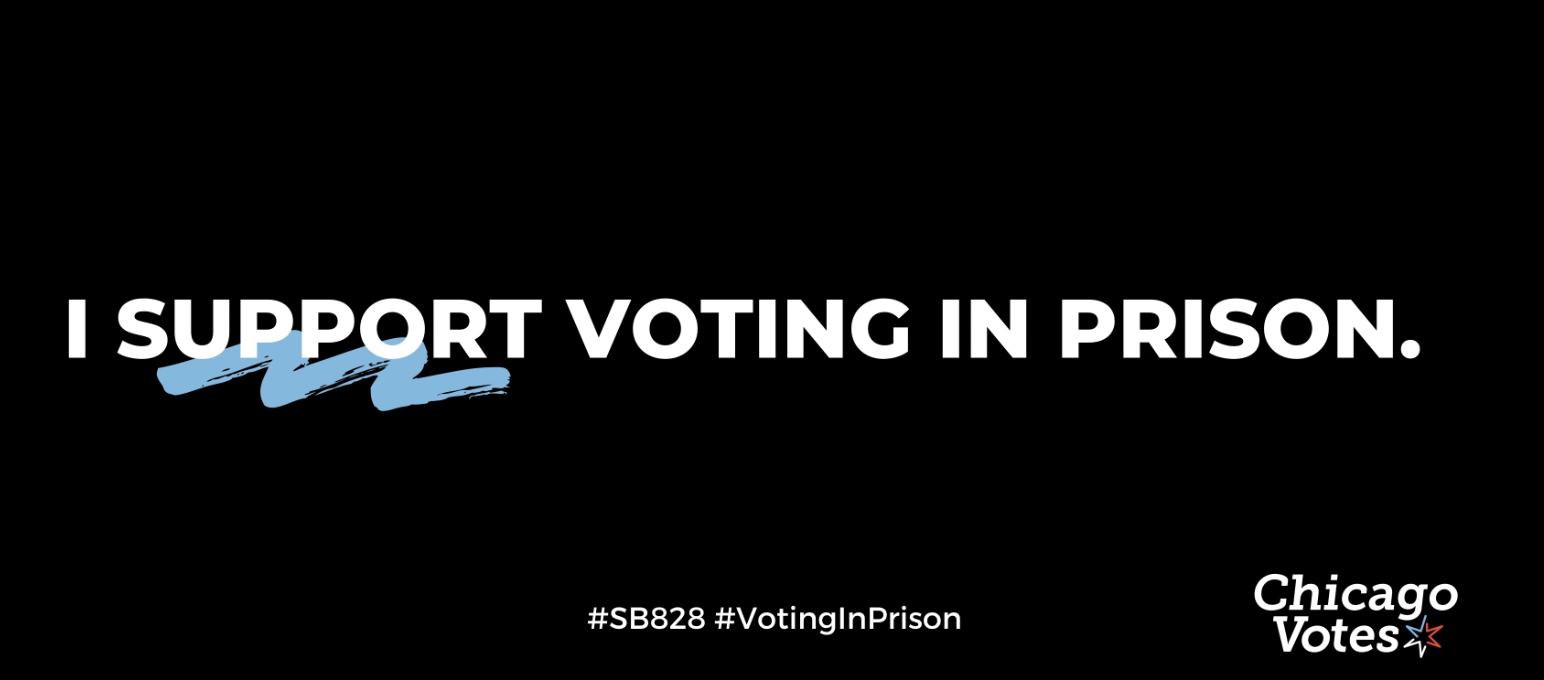In Illinois, there are just under 30,000 people incarcerated in state prisons who are restricted from voting, but yet are still impacted by the decisions of those elected officials that they cannot vote for. Advocates at Chicago Votes have identified this as a critical error in state government after observing an off-putting intersection in those impacted with 55% being Black and 43% are between the ages of 18 and 35. Evidently, felony disenfranchisement is majorly impacting young, Black Illinoisans. This is where Chicago Votes exists to advocate for citizens marginalized at this delicate intersection point, advocating towards an end to felony disenfranchisement with the introduction of Senate Bill 828, Voting in Prison.
Unfortunately, the language in Illinois constitution stating one “shall lose the right to vote, which right shall be restored not later than the completion of his sentence” doesn’t specify the exact length of disenfranchisement by failing to define “the completion of his sentence”. This completion could be interpreted by officials as one’s release from prison or alternatively one’s transition from parole, or even after the payment of any corrections related fines. In order to eliminate the potential for biased implementation, SB 828 amends the election code by repealing, “provisions that prohibit a person that is serving a sentence of confinement in any penal institution from voting until the release of his or her confinement”.
As the legislative session drew closer to an end, Chicago Votes organized a online and in-person opportunities for impacted and young Chicagoans to influence representatives including multiple twitter storms, lobby days and a rally at Illinois state capitol in support of SB 828. Hopefuls set their eyes on Speaker of the House, Representative Chris Welch, to call the bill for vote. Advocates distributed fact sheets to legislators listing the impacts of the bill in preparation for the Lame Duck session in January, which would be the last chance for the bill to become a law before the 103rd Illinois General Assembly is sworn in. If the bill fails to pass before the end of the lame duck session in January, then it would need to be re-introduced to the new body of legislators.
The young civil rights organization stands on the belief that when people in prison cannot vote, influence policy, or hold elected officials accountable then conditions like overcrowding, problematic judges, and “tough-on-crime” policies persist without recourse. A government committed to resolving these issues would invest in those people impacted and would insist on voting rights to restore some pathway for exchange with the population. After an independent polling of voters, currently over half of Illinois voters (56%) support a law to guarantee the eligibility to vote for all citizens 18 and older, including citizens completing their sentence, both inside and outside of prison, compared to just 33% who say they would oppose. This is outlined in a recent report published in September in partnership with the Sentencing Project, Stand Up America, State Innovation Exchange & Common Cause.
Along with this, Illinois Voting Rights Findings illustrate the strength of support for ending felony disenfranchisement, or universal suffrage, is also far higher than strength of opposition, with a third of Illinoisans (34%) saying they would strongly support such a law, compared to 19% of voters who say they would strongly oppose. This research demonstrates how the public opinion towards the act of re enfranchising incarcerated citizens is swinging in a positive direction and will continue as impacted citizens continue to increase their level of civic engagement and advocates continue to collectively organize behind regional political campaigns in support of universal suffrage.
Voting in prison is constitutional. The Chicago Lawyers Committee supports SB 828 in a letter to the Illinois State Board of Elections and other state level decision makers, “the actual intent of the legislative drafters supports the plain reading of the language. The delegates of the 1970 Illinois Constitutional Convention explicitly rejected a proposal that would have substituted ‘upon completion of his sentence’ for ‘not later than completion of his sentence’. ” The plain reading of this would infer that voting rights should be restored before one’s sentence would be completed, meaning that while some rights may have been taken a way (maybe in the process of awaiting trial) they should be restored and that writers intended for those rights to be restored. Cliff Helm, Program Counsel with the Chicago Lawyers Committee for Civil Rights explains, “This bill is both about democratic representation for the people and communities most impacted by the criminal legal system – and it’s also about ensuring that people who are incarcerated can continue to engage in society in one of the most meaningful ways we as a society have”. Civic engagement is restorative and should be revered as a considerable part in one’s process of rehabilitation, especially in a country where representative democracy is understood as inclusive.
At this stage legislators must respond to advocates, incarcerated citizens, their families, those attorneys and other supporters by holding a hearing with a vote on SB 828. It’s essential that community members know exactly where their representatives stand on the issue in order to hold elected officials accountable, especially as the lame duck session and as the transition into a new group of legislators approaches.

